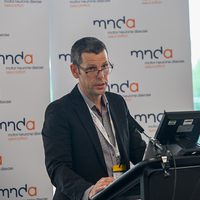Before you watch this webinar
Enhancing your learning experience begins with understanding you better. Collecting data enables us to tailor our educational content specifically for our audience. Discover more about how we handle your information in our Privacy Policy.
Event
What is MND, latest updates and research
Our sponsor

MND Academy webinar:
What are the signs and symptoms of Motor Neurone Disease? What treatment options are available? What support is available for me and my patients. Anything interesting coming through in the research arena? All these questions will be answered in this webinar.
Webinar objectives:
Delegates will gain a greater understanding of Motor Neurone Disease, know what treatments are available and be able to signpost their patients to further information and support.
Presentation slides
Summary
Motor neuron disease (MND) is a fatal, rapidly progressing disease that affects the motor neurons in the brain and the spinal cord. There is no cure, and people who develop MND will eventually become unable to move, swallow, talk, or breathe.
Dr Nick Cole, head of research, at the MND Association, explained that disease course was very unpredictable. “It can be very rapid, but there are instances of pauses in progression or even a slight improvement for a short period of time,” he said, adding that around one third of people die with a year, and more than two thirds within two years, of their diagnosis.
MND is an umbrella term, encompassing amyotrophic lateral sclerosis (ALS), which accounts for more than 80% of cases,[i] as well as progressive bulbar palsy (PBP), progressive muscular atrophy (PMA), and primary lateral sclerosis (PLS).
Around 35% of people who develop MND will first experience mild cognitive change, which causes difficulties with planning, decision making, and languages. A further 15% will have signs of frontotemporal dementia, which will trigger much more pronounced behaviour change.[ii]
The symptoms include muscle wastage and weakness, fasciculation, cramps, spasticity, pain, and fatigue. People may experience respiratory, speech, swallowing, and sleeping problems, excess saliva and mucus, weight loss, and the pseudobulbar affect, or frequent, involuntary and uncontrollable outbursts of crying or laughing.
The senses, bowel and bladder function, sexual function, eye muscles are the heart are rarely affected. “People are effectively trapped in their bodies. They can think and feel and have all those emotions, but they are unable to move,” said Nick.
The care landscape
Rapid and accurate diagnosis is crucial to ensuring people get access to the right care, but it is complex. There is no single test for MND, and diagnosis is usually achieved via a process of elimination. There is an urgent need for biomarkers, Nick said, not only to aid diagnosis but to inform outcome measures in clinical trials. “At the moment, the only way to measure if a drug is effective is to measure the level of disability,” he said.
The NICE guideline on MND assessment and management, NG42, was last updated in 2019, and is currently undergoing an extraordinary review. Nick said he hoped the process, which was initiated following representations from an MND Association expert group, will lead to a more evidence-based, best practice-led guideline.
“One thing we know is that multidisciplinary care is the most effective way to improve survival and quality of life for people with MND,” said Nick. “That’s something that we are really focusing on, and we have 23 care centres around the country where people can be looked after as best as possible.”
While a number of treatments for MND have been approved in recent years ,Nick said there were imperfect, and were only able to slow progression by a small amount. “We are still a long way from a really effective treatment or a cure,” he added. “But there are things in the pipeline, work is going on, and discoveries are being made.”
The research landscape
Research is the “only way we will understand the disease and find treatments”, said Nick, adding that recent years had witnessed a significant increase in the number of MND-focused publications. “There is never a good time for MND, but there has never been a better time than now.”
This explosion in research is, at least in part, being driven by new gene discoveries. In some cases, MND runs in the family, so that has hinted at a genetic cause for some time. With the advent of technologies, supercomputers, and incredible scientists working out ways to sequence genomes, we can now sequence a genome in under 24 hours for less than $1,000.” This has allowed researchers to identify genes associated with MND. “There are new discoveries being made all the time.”
Scientists have also been able to better understand the characteristics, processes, and interactions of motor neurons, and what makes them vulnerable in MND. “This has given us real targets of where to focus the research.”
Such discoveries are now informing clinical trials. In the UK, seven MND c trials are ongoing, with one testing three drugs at once. “We are coming at MND from all angles,” said Nick, explaining that the trials were investigating various approaches, including genetic therapies and antiviral medications. “Hopefully, one more or all of these will result in a positive outcome, which would be fantastic.”
[i] Yedavalli, V. S., Patil, A., & Shah, P. (2018). Amyotrophic lateral sclerosis and its mimics/variants: a comprehensive review. Journal of clinical imaging science, 8.
[ii] MND Association. Cognitive change and frontotemporal dementia. (2023). Available at: https://www.mndassociation.org/professionals/management-of-mnd/cognitive-change-and-frontotemporal-dementia-and-mnd Ladt accessed: 3 October 2023.
Were you registered on this course?
Log in to access resources..
LoginOur sponsor

CPD Accreditation
'What is MND, latest updates and research' has been approved by the Federation of the Royal Colleges of Physicians of the United Kingdom for 1 category 1 (external) CPD credit(s).
MND Academy
Better understanding, optimised management, improved quality of life
